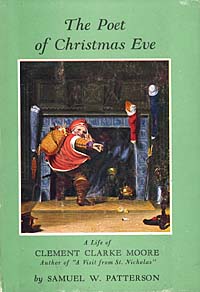NEW YORK (Reuter) - Doubt is being cast on whether Clement Clarke Moore was the author of one of the world's most masterful
pieces of Christmas poetry - A Visit From St. Nicholas.
Legend has it that Moore, a professor of biblical learning, scribbed down the 56 lines that comprise the delightful bit of
doggerel on a snowy Christmas Eve in 1822 for the entertainment of his five children.
The poem provided millions of youngsters with the first definitive description of what St. Nicholas - or Santa Claus or Kris
Kringle or Father Christmas - looked like.
He was a jolly old elf, with twinkling eyes, rosy cheeks and a cherry-like nose, laden with a bag of toys and making his rounds
in a sleigh drawn by eight tiny reindeer.
While the imagery is correct, the source is not, says W. Stephen Thomas, director-emeritus of the Rochester Museum of Science.
"The evidence strongly suggests that Clement Moore did not write the poem but that Henry Livingston did," Thomas
said in an interview.
Livingston was a poet, gentleman farmer, musician and army major who, Thomas, a direct descendant, says, appears to have written
the famed poem, although he never book credit for it. A number of scholars agree.
Through the years, Livingston's descendants have tried unsuccessfully to convince literary historians that he and not Moore wrote A Visit
From St. Nichols.
Thomas has in his possession written by one of Livingston's daughters, Eliza, in which she said her father had written and then recited
the verse to his children long before it appeared under Moore's name.
She said two of her brothers had copies of the manuscript. One of the brothers, Sidney, was quoted by his son in the 1940s as
having said he recalled his father reciting the poem in 1804 when Sidney was eight.
[Sidney was the first to have his father's manuscript.
On Sidney's death, it was given to his brother Edwin. Edwin moved to Wisconsin and the manuscript burned in a house fire.
Henry Livingston, of Babylon LI, wrote to his cousin Cornelia Griswold Goodrich in 1900.]
Thomas said most literary historians agree that the poem first appeared anonymously in a Troy N.Y. newspaper in 1823.
"However, descendants of the Livingston family have offered testimony the poem was published years before in a Poughkeepsie (NY)
paper to which Livingston had contributed poems.
"Unfortunately, there is no known record of that particular edition."
Thomas said a study of the styles of Livingston and Moore supports the belief that Livingston wrote the poem.
"The meter, the figures of speech and the difference in personalities of the two men strongly indicate that Moore could not
have written the poem," he said.
"Moore was a heavy-handed writer who did not have a lyrical touch. Livingston, on the other hand, was an expert in light verse."
Support for the debunking of Moore as the author of the children's classic has been expressed by literary historian
Helen Wilkinson Reynolds and Henry Noble McCracken, the late president of Vassar College.
Mrs. Reynolds, who analysed a small volume of verse in which Moore for the first time incorporated A Visit From St. Nicholas, wrote:
"The spirit and style (of the Christmas poem) are totally unlike Dr. Moore's usual habit of thought and manner of writing and totally
unlike anything else in the book."
McCracken went even further. He wrote: "There runs through all Professor Moore's verse a kind of frustration. ...
He was a self-torturing Midas; all around him was a rich harvest of poetry which he turned to lead."
"These four qualities - the childhood level of miniature, the motion of flying, the adjectives of joy and the
speed of action - are characteristic of Major Henry and woefully lacking in Moore."
Thomas also points out that Moore, after first claiming he had written the poem, later became more vague about its origins.
However, he concedes that all of his evidence is circumstantial.
Samuel White Patterson, in his biography of Moore, reproduced a handwritten facsimile of A Visit From St. Nicholas.
"I'm positive Livingston wrote it, but it's admittedly hard to prove," Thomas said.



![]() Copyright © 2014, InterMedia Enterprises
Copyright © 2014, InterMedia Enterprises